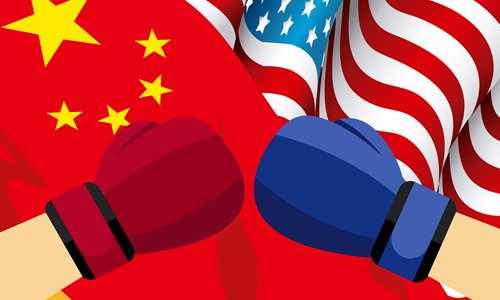Does the US realize trade wars are not easy to win?
By Ai Jun Source:Global Times Published: 2019/9/10 22:38:40

Photo: Global Times
Is the US-launched trade war against China a quick battle or a protracted war? From the beginning, Washington believed it could score a quick victory and bring Beijing to its knees by pressuring the latter and spilling their trade conflict onto the political and technological fields. But the US has finally realized that its theory had failed.
The trade war has become a protracted war. This is also what Beijing concluded based on US strategies and China's strength when their conflict first emerged.
That's what China believes because the US has been domineering and self-centered. As Washington acts more hegemonic, it is impossible for China to accept US demands at face value.
The trade problems between China and the US have been accumulated over a long period of time. To resolve them, time and strenuous efforts are needed. If Washington insists on charging exorbitant amounts without taking mutual benefit into account, all China can do is to fight back. Beijing's countermeasures remain resolute.
Furthermore, China has a sober awareness of its own comprehensive strength and is turning pressure from the US into a driving force of its economic restructuring, which has yielded remarkable results.
The US, however, has been getting above itself, believing it can reach any goal it wants, since it is the world's top power. US President Donald Trump has been tweeting that "trade wars are good, and easy to win." Washington has clearly underestimated China's capabilities and will to fight back, as well as its national strength.
It took about one and a half years for the US to realize this.
Since July, pessimism has been rising in the US over its previous fantasy that Washington could quickly win the trade war. On July 16, Trump mentioned there's still a long way to go to reach a deal with China. Last Friday, White House economic adviser Larry Kudlow said, "If that (trade negotiation with China) takes a decade, so be it." The US has finally acknowledged that its tension with China could only be sorted out through long-term negotiations rather than quick solutions for temporary US political needs.
The tests China is about to face, after the trade war turns into a protracted battle, will not be easier.
But one thing is certain: The US must have a more profound understanding of China's resilience and endurance under pressure, be it economic or systematic. The world is also getting to know China better.
Which country is more desperate to see the trade war end? US media tends to raise the question with a sense of superiority and confidence. Yet today, they need to think twice. It is not a matter of showing which country is stronger. The point is Beijing and Washington should have a correct understanding of each other, while avoiding misjudgments. China and the US have been deeply integrated, and misjudging each other would mean disaster for not only themselves but the world.
Posted in: OBSERVER,CHINA-US